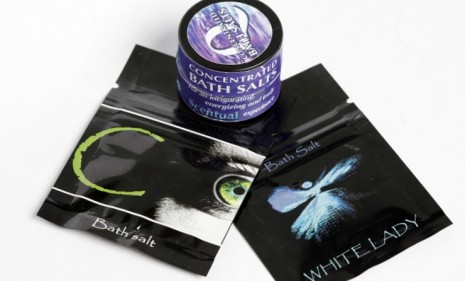Bath salts and fake pot: America's new drug war
Synthetic, over-the-counter drugs that mimic the effects of cocaine and marijuana are gaining popularity. But are they more dangerous than the real thing?

A free daily email with the biggest news stories of the day – and the best features from TheWeek.com
You are now subscribed
Your newsletter sign-up was successful
The latest drug craze sounds innocent enough: Incense and "bath salts" sold under names like "K2," "Spice," "Purple Wave," and "Bliss." But these products, when smoked, snorted, and eaten, are serious synthetic narcotics and hallucinogens that mimic marijuana and cocaine, but with an often unpleasant and sometimes deadly high. What's more: They are legal in most states. Here, a guide to America's bath-salts epidemic:
What are these synthetic drugs?
They fall into two categories: Fake marijuana and "bath salts." The synthetic pot, like the product known as K2, is made from dried plant material sprayed with chemical compounds. Most of the chemicals were developed at Clemson University in the 1990s for research, but never tested on people. The bath salts, sold under names like "Bliss," are crystallized chemicals featuring two strong stimulants that mimic cocaine, meth, and LSD. Both are sold in head shops for as little as $10 a pop, and neither shows up in common drug tests.
The Week
Escape your echo chamber. Get the facts behind the news, plus analysis from multiple perspectives.

Sign up for The Week's Free Newsletters
From our morning news briefing to a weekly Good News Newsletter, get the best of The Week delivered directly to your inbox.
From our morning news briefing to a weekly Good News Newsletter, get the best of The Week delivered directly to your inbox.
What do the drugs do, exactly?
"Many of the users describe extreme paranoia," says Dr. Mark Ryan at the Louisiana Poison Center. "The recurring theme is monsters, demons, and aliens. A lot of them had suicidal thoughts." The most infamous K2 incident involves 18-year-old David Rozga of Iowa, who smoked the drug, then went home and committed suicide with a shotgun. In Kentucky, a young mother on bath salts reportedly pulled her car over on the highway and dropped her 2-year-old son on his head because she was convinced he was a demon.
And they're legal?
Sort of... but maybe not for long. The Drug Enforcement Administration has banned five of the chemicals used in making the fake pot, as have at least 20 states. Nine states have outlawed substances in the bath salts, with 25 more considering similar laws.
A free daily email with the biggest news stories of the day – and the best features from TheWeek.com
Where did they come from?
India, China, and elsewhere in Asia, originally. They became popular in Britain and Germany a few years ago, then spread to the U.S.
Just how widespread is this problem?
Over the past year they've been tied to nine deaths and hundreds of emergency room visits. And it's getting worse. Bath salts alone led to 1,511 trips to the ER so far this year, up from 302 in all of 2010, according to the American Association of Poison Control Centers. The two drugs together are responsible for at least 2,700 bad trips so far this year, versus about a total of 3,200 in 2010.
Who's using these drugs?
Teenagers and college-age kids. The U.S. Naval Academy has expelled 12 students this year alone for possessing synthetic marijuana, and last year more than 110 sailors were disciplined over fake pot. But Des Moines head shop owner Kathy Fielder says two-thirds of her fake-pot buyers are middle-aged. "I even have grandmothers coming in," she says.
Are the drugs here to stay?
Drug enforcement officials aren't optimistic. "Because they're synthetic compounds, some of the underground chemists can stay one step ahead of us because they just change the molecular structure," says DEA agent Gary Boggs. "That's the challenge with synthetics — things can be changed through chemistry." That's a good reason to legalize the real thing, says Fielder. "Sometimes it's better to live with the devil you know than have the devil you don't come in."
Sources: CBS News, Associated Press (2), Daily Mail
-
 Quentin Deranque: a student’s death energizes the French far right
Quentin Deranque: a student’s death energizes the French far rightIN THE SPOTLIGHT Reactions to the violent killing of an ultra-conservative activist offer a glimpse at the culture wars roiling France ahead of next year’s elections.
-
 Secured vs. unsecured loans: how do they differ and which is better?
Secured vs. unsecured loans: how do they differ and which is better?the explainer They are distinguished by the level of risk and the inclusion of collateral
-
 ‘States that set ambitious climate targets are already feeling the tension’
‘States that set ambitious climate targets are already feeling the tension’Instant Opinion Opinion, comment and editorials of the day